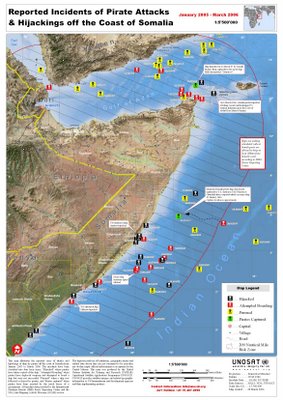
Newsweek pumps up the volume on one of the risks of the Somali pirates in this piece:
Piracy off the coast of Somalia, a country that for 15 years had no central government and no internal law enforcement, is soaring. In the past 12 months, Somali bandits have held up 36 merchant ships (compared to two in the previous year), forcing many of them to shore and holding crew and vessels ransom for hundreds of thousands of dollars. The hijackings have forced vessels to take wide detours at a cost of millions and have disrupted many of the humanitarian shipments to Somalia, which is suffering this year from the worst drought in a decade.Newseek is late to the party in expressing its concern. I had a post that mentioned the capturing of a merchant ship for use as a weapon in Jan 2005 here and in February 2005 here. Bill Roggio at The Fourth Rail had a post on the threat back in April 2005. Austin Bay had a piece at Strategy Page which included this:
But Navy officials worry about an even more alarming scenario: that Al Qaeda cells operating in Somalia might get involved in the piracy, hijack a ship and use it to ram another vessel. "“You don'’t want [terrorists] to do anything out there that may support their efforts, whether it'’s making money, holding hostages or taking another vessel and using it as a weapon,"” says Cmdr. Jeff Breslau, a spokesman for the U.S. Fifth Fleet based in Bahrain.
The collision scenario could exact a heavy toll. When Al Qaeda suicide bombers smashed a small boat into the USS Cole in 2000 in the Yemeni port of Aden, 17 sailors died. Pottengal Mukundan, who tracks piracy from his office at the International Maritime Bureau in London, says Somali gunmen regularly commandeer much larger vessels, including cargo ships and bulk carriers. Security officials also worry about the economic consequences of a vessel being rammed into a key port and disrupting international trade.
But most troubling for U.S. officials is the prospect of terrorists hijacking a supertanker transporting extreme flammables like liquefied natural gas (LNG) and blowing it up close to shore. Eben Kaplan, who authored a recent study on LNG for the Web site of the Council on Foreign Relations, says the gas requires very specific conditions to explode-—a precise vapor mix when it leaks from a ship. But if the conditions are met near a population center, the explosion could kill many thousands. "“It has the potential to be a very serious weapon,"” Kaplan says. It also makes for good drama: an attack on a ship transporting LNG was fictionalized in the closing scene of the George Clooney film "“Syriana."”
"In 2005, Al-Qaida is very much in the Horn of Africa," a U.S. intelligence officer said during a background brief. "But we're there, too. CJTF-HOA supports a spectrum of counter-terror operations."In short, it is a concern, has been a concern and will be a concern into the future.
The intelligence officer emphasized the role Djibouti's seaport and airbase play in supporting coalition naval operations in the Red Sea and Indian Ocean. That force includes ships from German, Spanish and other allied navies. The ships and aircraft conduct "counter-terror surveillance operations" -- which means stopping and inspecting everything from rowboats to oil tankers.
Four years ago, terrorists tried to sink a French tanker as it passed through the Bab Al Mandab Strait between Yemen and Djibouti. The navies have also tackled the pirates that plague the area. Terrorists and criminals cooperate on land -- terrorist organizations with cash can also buy a pirate.
But put the threat in to the context of the physical location of Somalia and what areas might be at risk from a seized ship.
Here's a hint- it ain't New York or LA or San Francisco that would be in danger.
The map, taken from the UNOSAT web page show the most recent attacks off Somalia (click it and it gets bigger). You might note that the largest number of successful hijackings occurred off the east coast, not in the Gulf of Aden. Now, quick, what major US interest can be threatened that lies off the east coast of Somalia? You can provide your answers in the comments.
And taking a captured ship off on a long distance journey to, say, the Strait of Hormuz or Diego Garcia seems unlikely to me. Probably easier to grab a ship nearer to the desired target than off Somalia and give the navies of the world the chance to hunt you down...
I do recommend the LNG article mentioned in the piece by Eben Kaplan found here but not because it suggests the danger is severe from LNG ships captured by terrorists, but because overall it puts the threat into a realistic context- the posibility of a "worst case" disaster does exist, but the "worst case" is hard to get to. As I said in my own post on the LNG terrorist tanker danger:
What about an "at-sea" take over and the use of an LNG tanker as a shipborne improvised explosive device (SIED)? Again, it wold take a substantial amount of work on the part of terrorists and everything they did would have to work perfectly in a perfect environment. Breach the LNG vessels, spill the LNG, let the LNG reach the right 5-15% air mixture and try and accomplish all this uderway while ramming or approaching other ships at speed without wind. Not likely.

No comments:
Post a Comment